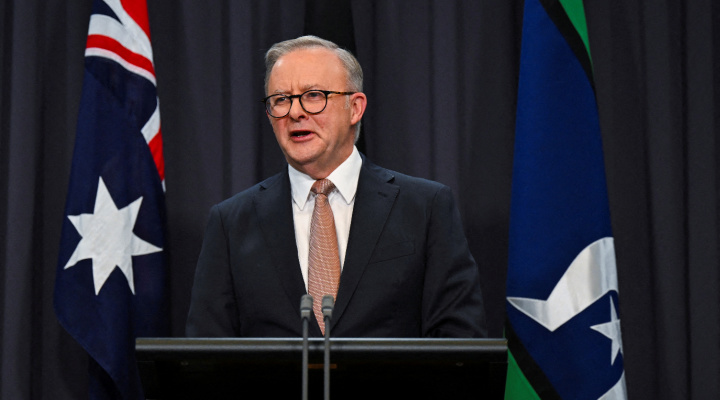Australian Prime Minister Anthony Albanese speaks during a press conference at the Parliament House in Canberra, Australia, June 17, 2024. Photo: Lukas Coch/Pool via REUTERS
On August 11, 2025, Australian Prime Minister Anthony Albanese stunned many when he announced that Australia would formally recognize the State of Palestine at the upcoming UN General Assembly — pending promises by the Palestinian Authority to demilitarize Gaza, exclude Hamas from governance, hold elections, and cease payments to families of terrorists.
The glaring problem is that Albanese appears to take these assurances at face value, as though a handful of pledges — offered without timelines, enforcement mechanisms, or credible evidence of intent — could erase decades of violence, corruption, and rejectionism.
It’s the mark of a leader who doesn’t know what he doesn’t know: either unaware of the PA’s long record of breaking its commitments or unwilling to confront the implications of that record. He also doesn’t understand that this is a reward for terrorism and, for the enemies of freedom, liberty, and democracy.
The question I find myself asking today — whether I am truly choosing Aliyah, merely considering it, or being pushed toward it — is not a new one. Over centuries, Jews have wrestled with the call of Aliyah — “ascent” to the ancestral homeland — versus the pull to remain in the Diaspora. For some, it was not the call of Aliyah at all, but the search for a safe haven — somewhere in the world where they could live without fear.
My grandparents had that promise; they went to Canada believing it would be that place. Now, I’m not sure where in the Diaspora that promise still exists.
And without that sense of safety, Aliyah no longer feels like a romantic, idealistic choice — how I’ve seen it most of my life. Instead, it starts to feel like the only real option left. Ahad Ha’am wrote that Aliyah should be a deliberate, inspired choice, not a desperate escape — and that truth has long been woven into our collective soul.
Today, the landscape is starkly different. Aliyah is shifting from a Zionist aspiration to a contingency plan. After October 7 and the surge of antisemitism worldwide — including here in Australia — the Diaspora finds itself asking: what’s our Plan B? And of course, many Diaspora Jews — in Australia, in Canada, in France, in the United States, in the United Kingdom, and across the world — are not even considering the choice to move but instead are deepening their connection with Israel. There is comfort in knowing we have somewhere to go; there is a psychological sanctuary that our ancestors lacked, and we have it. That knowledge is a safety net, one that offers reassurance even to those who never plan to use it.
Australia’s recognition of Palestine, dressed as a diplomatic advance, feels deeply personal and destabilizing. For those of us whose Jewish identity is rooted not only in heritage but in the continuity of a safe, supportive homeland, this punting of responsibility troubles the heart.
Albanese’s decision shows the danger of a leader who doesn’t know what he doesn’t know: he steps into a geopolitical minefield believing he is making history, without recognizing that he is rewarding terror, undermining alliances, and ignoring lived realities on the ground. Did I just get nudged toward Aliyah by the government’s betrayal? Perhaps. But even if I never make the move, the knowledge that Israel exists — that there is still one place where we are not guests — remains a lifeline in an increasingly uncertain world.
Will the Palestinian Authority honor its conditions, or is recognition merely a performative act? Has Australia fractured its alliance with Israel at a moment when global support is profoundly precious? Is this recognition a hopeful step toward peace, or a perilous reward for violence? These are not only diplomatic questions — they are mine and ours.
As a Jew in Sydney today, I stand torn between devotion to a country I’ve called home for over 30 years and the ancient, pulsating call of Zion. Aliyah no longer feels like a choice — it feels like inevitability. But while we are here, we must live as proud Jews and proud Zionists, unafraid to stand tall in our identity. We must educate — not only within our own communities, but in the broader Australian community — about our history, our homeland, and our truth. That is both our responsibility and our strength.
Perhaps both history and the present have finally pushed me to the place my grandparents only dreamed of. L’Shanah Haba’ah B’Yerushalayim.
Michael Gencher is executive director StandWithUs Australia, an international nonpartisan education organization that supports Israel and fights antisemitism.
Click this link for the original source of this article.
Author: Michael Gencher
This content is courtesy of, and owned and copyrighted by, https://www.algemeiner.com and its author. This content is made available by use of the public RSS feed offered by the host site and is used for educational purposes only. If you are the author or represent the host site and would like this content removed now and in the future, please contact USSANews.com using the email address in the Contact page found in the website menu.








